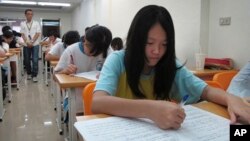Taiwan’s annual university admissions exams are taking place this week as tens of thousands sweat over math and language questions to get into top schools. But the exams that depend exclusively on memorization of high school class content are in their final years as officials worry they put Taiwan at a competitive disadvantage.
Taiwanese officials believe their economy is losing ground to neighbors such as China and South Korea as younger people often shun the risks of starting a company or inventing the next line of high-tech hardware.
To improve the country’s prospects for innovation, the Ministry of Education will roll out a new screening process for university students so top schools can accept more enterprising people. The new system, effective from 2018, will include personal interviews and let high school graduates show they excelled outside class, not just memorized material as taught.
Ma Hsiang-ping, the ministry’s deputy director for higher education, said a more diversified exam system will look for people interested in invention or starting businesses.
She said that if people in other countries are the ones inventing new things, the country’s level of competitiveness will decline. She said the ministry hopes that the 12-year public education will not focus only on exams and that in the future it can take into account not just memorized knowledge but other talents as well. She added that the written test should be used only to show that a student has basic knowledge.
The education ministry plans to replace today’s standardized written exams between 2018 and 2021. That would make Taiwan an outlier in East Asia, where university enrollment systems still rely heaviest on tests of memorization. Ma said Taiwan will switch to a Western-style scheme that rewards extracurricular works such as published articles. To foster an interest in innovation early on, her ministry will rebuild the school curriculum.
Chang Wei-chun, a third-year law student at Ming Chuan University in Taipei, said Taiwan’s educational reforms should carry into higher education.
Chang said that if officials are thinking about improving innovation, they should promote it through tutorial classes at universities. Chang argues that otherwise, many students won’t dare to do enterprising work because their education has not been practical.
Taiwan, dependent largely on high-tech exports, ranked 14th last year in Swiss business school IMD’s global competitiveness yearbook but behind fellow Asian peers such as Hong Kong, Singapore and Malaysia.
The deputy education minister said Taiwan’s traditional Chinese culture, spread by the parents of high school students, also discourages some younger people from trying new things. But she added that university courses offered today around Taiwan to stimulate innovation are full. About 300,000 students graduate from Taiwan’s universities every year.
She said a lot of conservative Taiwanese parents think their children have stable work; that’s part of the culture. Nonetheless, a lot of students say they want to go out and do something different, like innovate or start a business.
The outcome of this year’s exams will decide the university admissions of 146,000 people, many of whom will aim for the top 10 of Taiwan’s nearly 150 schools.




